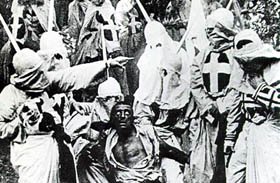Controversy aside, this remains a powerful artifact in cinema.
If Leni Riefenstahl’s Triumph of the Will was critized for being a perpetrator of propaganda and facilitated a movement of racism, D.W. Griffith’s best film and perhaps the greatest film of the silent film era elicited the same kind of criticism. Censorship didn’t deter this film from being one of the most successful pictures of that time, despite the fact that it wasn’t the political agenda of both of these films that is became the center issue but rather the power that is feed behind the wrong causes. Based on Thomas Dixon’s play and book which propelled his anti-black sentiments and altered the events of the Civil War and the reconstruction phase, The Birth of a Nation finds itself labeled as either as a film above others for its excellence in filmmaking with revolutionary film techniques that pushed movie-making in a whole new direction or as the politically incorrect film that gave a sympathetic look to the plight of Ku Klux Klan. Notwithstanding the powerfully arousing influence it had on audiences at that time, it is the elaborate set-ups especially with some nicely shot sequences of the tireless civil war, the use of parallel action mounted up in editing visible in the black man ready to marry sequence and a dramatic, triumphant sense in the film’s finale showing that the hero says the day that demonstrates Griffith’s strong sense of filmmaking and storytelling. While today’s audiences might grapple with questions about the painted blackface on white actors or the long three-hour run time, film historians will continue to discuss the merits of this film’s innovative filmmaking as witnessed with the moving of the camera and the film’s sensitive moral issues.
For more on this film visit:
